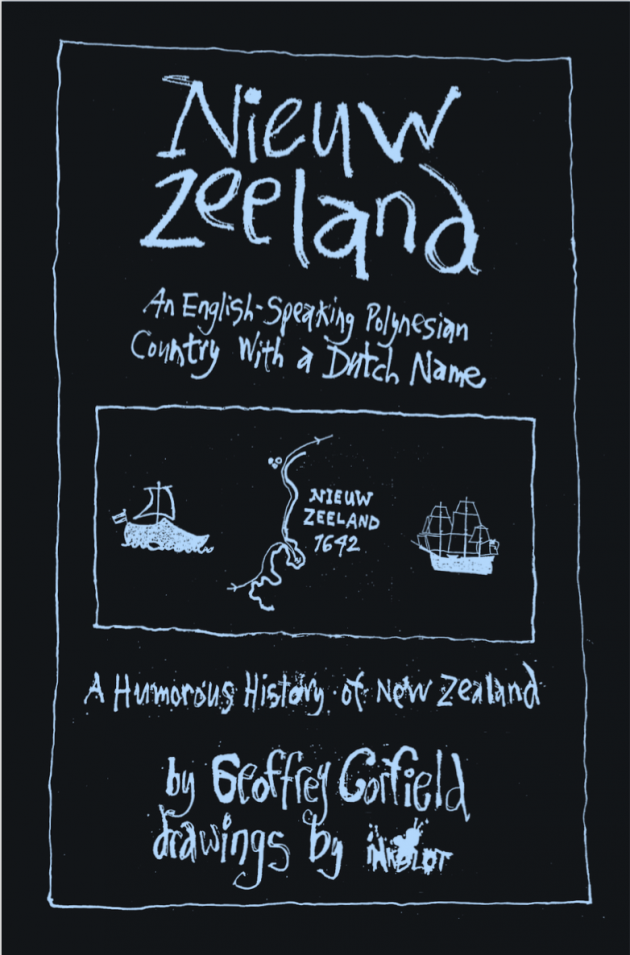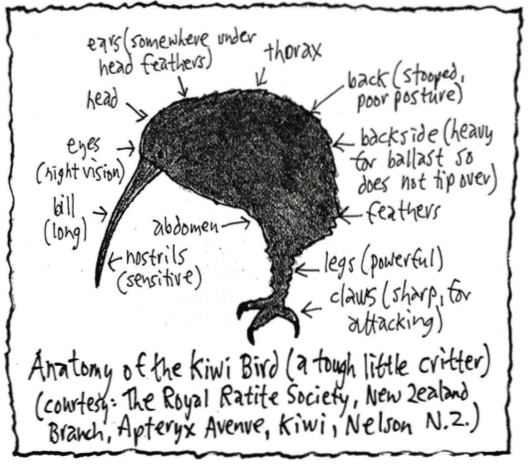Do you remember the days of serialised radio shows and novels? A serial book is a work of fiction or non-fiction that is published in sequential pieces called instalments. These instalments can be published at nearly any interval for nearly any period of time, though weekly and monthly instalments are most typical.
Every Wednesday from today onwards we will be publishing half a chapter of Nieuw Zeeland An English-Speaking Polynesian Country with a Dutch Name: A Humorous History of New Zealand by Geoffrey Corfield.
It is a MUST read as it has had the infamy of being rejected by non-other than that bastion of balance, Otago University.
Kia ora Geoff
Thank you for the book. I can see that you are a clever man, and some of your ideas are really witty. But in writing a ‘humorous history’ of New Zealand you display a lack of knowledge of and sensitivity for the protocols that bind us as a bicultural nation, and the story of ruthless colonisation that underpins New Zealand’s history. […] it transgresses so many aspects of Maoritanga.
For instance, your sketches of Te Rauparaha and Hongi Hika would certainly cause offence to the ancestors of these great warrior rangatira. Throw-away comments, such as ‘Maori are complicated people’ (and therefore to blame for something), brand this publication Eurocentric and untenable. Mockery of Maori, eg of King Tawhiao Potatau (‘From King Potato II we get the rhyme: “One potato, two potato, three potato, four”’) is unacceptable.[…]
Nga mihi
Otago University

Chapter One:
New Zealand history is complicated. Many people won’t believe this. How can it be? How can the history of a small island country out on its own in the world’s biggest ocean with no nearby neighbours, be complicated? Well, it can, and it is.
New Zealand has an English version of a Dutch name. This isn’t overly complicated. The Dutch had first crack at New Zealand, but they didn’t give it much of an effort. They didn’t even step foot on it. They tried, but the locals weren’t very welcoming, so they just sailed along past part of the west side of it, marked it as a squiggly line on a map, and left 24 days after they’d arrived, never to return.
This was in 1642. They did, however, give New Zealand its name, which was quite an accomplishment under the circumstances. Nieuw Zeeland’s Dutch name became New Zealand’s English name, and New Zealand became an English-speaking Polynesian country with a Dutch name. Interesting, but not overly complicated.
British history is complicated by centuries of Kings and Queens and wars. New Zealand history is different. It’s simpler and shorter, and it’s complicated by two other things: the British themselves, and the Maori. The British had second crack at New Zealand after the Dutch, and they placed complicated government systems on New Zealand. The Maori, the native people the British found living in New Zealand, and the ones that chased the Dutch away, are a complicated people (tribal people are often complicated people).
The history of New Zealand then is complicated by complicated British government and complicated Maori people. British government gets entangled with Maori tribes. Maori tribes get entangled by British government. It all gets rather complicated.
By the time the British begin to take a reluctant, half-hearted interest in New Zealand (1833), they’d already had lots of experience with colonies and had perfected various complicated systems of colonial government which they could then just plop down on New Zealand. Which is what they did. They tried numerous sorts.
The more time a country has to develop government systems, the more complicated the government systems can become. The British had been perfecting complicated colonial governments in Canada, Guyana, the West Indies, Sierra Leone, the Gambia, South Africa, Malta, Gibraltar, India and Australia; long before they got around to New Zealand.
New Zealand was actually one of Britain’s last colonies, and it arrived at a time when they had little enthusiasm left for new colonies. Yet the British parliament spent more time debating the affairs of New Zealand than they spent on the affairs of any other colony. New Zealand colonial government was a complicated business.
Britain went out to purposely settle Canada. Britain went out to purposely settle Australia. But Britain did not go out to purposely settle New Zealand. At first they didn’t really know what to do with it, but as there were British people living there, it was them who dragged the British government into New Zealand. And so into a complicated Maori tribal system you added complicated colonial government systems.
The British arrived in New Zealand 127 years after the Dutch, and they found people living there just as Abel Tasman said there were. Some of them were friendly. Some of them were warlike. Some of them were friendly then warlike. Some of them were warlike then friendly. They seemed like other Polynesian people, but they weren’t. They turned out to be quite a complicated people indeed. A people unlike any other the British had ever come across in any other part of the world. And the British had been in pretty well every part of the world by then.
Part two of Chapter one will be published next week.

